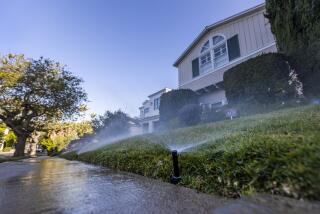Endorsement: Yes on Proposition 68 to preserve parks, protect water supply and enhance our climate resilience
Proposition 68 would allow California to sell $4.1 billion in bonds to pay for desperately needed improvements in parks and water systems. It’s a sound investment. Failing to upgrade our infrastructure now would likely mean higher costs in the future. The bond sale would, of course, require interest payments over the years, but they would appear to be well within the guidelines for prudent financing. Californians should vote yes.
There are a lot of good things in this bond. It would add sorely needed funding for state parks, many of which nearly closed or were commercialized less than a decade ago to make ends meet. It would help the state park system deal with a huge maintenance backlog.
It would help pay for regional and local parks, trails and amenities as well. For Los Angeles County, whose residents voted in 2016 to tax themselves for parks improvements, local revenue would go farther with matching funds from the bond and would be leveraged to do more work sooner. Like the local tax, this bond would help correct longstanding inequities that left many low-income communities without parks. Translation: Much of that money would come to parts of L.A.
And there would be funding for the types of water projects that will be crucial to a California with more climate volatility, shrinking Sierra snowpacks and scarcer water: flood protection, groundwater cleanup (in places like the San Fernando Valley, which holds the key to L.A. becoming more water self-sufficient) and water recycling.
Huge chunks of funding would be allocated to projects in and along the Los Angeles River, and the San Gabriel and Santa Ana rivers as well.
And importantly, the bond includes badly needed funding to mitigate problems at the too-often-forgotten Salton Sea, which is shrinking as farms reduce the agricultural runoff that once kept the briny lake full. Proposition 68 money will help sustain a smaller Salton Sea as an important part of the Pacific flyway, a north-south migratory route for birds, and at the same time curb the toxic dust problem created by the increasingly exposed lakebed.
There is something for everyone in this measure. That’s how bonds get to the ballot.
Of course, if you read the endorsements of Proposition 68 in newspapers around the state, you will see enthusiasm in each for their own local projects. There is something for everyone in this measure. That’s how bonds get to the ballot. They are a result of bargains and compromises among politicians, regions and interests.
Although that should not dampen anyone’s enthusiasm for this particular measure, it should put it in some perspective. Voters have a right to expect that the bonds they approve cover items in a statewide shopping list that has been carefully vetted for need and priority, not merely for political expedience.
That’s especially the case for water bonds, given that the state is currently paying interest on older bonds, and a state commission is set to decide next month how to spend millions of dollars from a water bond that voters approved four years ago. And voters should be aware that they will be asked to approve yet another water bond in November — to raise twice as much money as Proposition 68.
So are they all necessary? Are they non-duplicative? Do they rationally pick off parts of a comprehensive California water strategy?
For the most part, yes. That strategy is constantly updated as the state’s circumstances change, and the details of each bond are crafted largely out of public view, but the guiding document is the California Water Action Plan that Gov. Jerry Brown put forward in January 2014.
Voters also must consider whether the state can afford not only this bond, but the two others — the November water bond and also a housing bond — that also may pass.
If all are approved, would the state’s interest payments on its entire bonded indebtedness still be within the limits for responsible financing? In other words, can we afford all this borrowing?
Yes — the state would continue to spend 6% or less of any given year’s general fund revenues on bond interest payments. Probably. We can’t know for certain how much revenue the state will have in any given year, and we can’t be sure that any given state treasurer would sell approved bonds only when it’s responsible to do so. There will always be an element of faith involved in borrowing. But the risk is not unreasonable, and not financing water bonds will leave the state unprepared for the future. Proposition 68 is a good deal. Vote yes.
Follow the Opinion section on Twitter @latimesopinion and Facebook
More to Read
A cure for the common opinion
Get thought-provoking perspectives with our weekly newsletter.
You may occasionally receive promotional content from the Los Angeles Times.






